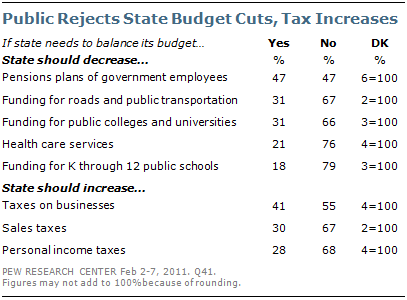Matthew Yglesias's Blog, page 2422
February 12, 2011
Is Human/Android Coexistence Possible?
In response to a Maryland activist's dire warning that if the state passes a gay marriage bill then "you will set the groundwork, that one day when artificial intelligence is that advanced, we will be considering whether or not people can marry their androids."
Jamelle Bouie and is eager to sign himself up as the world's first advocate for android marriage equality. Ultimately, I think all serious considerations of marriage slippery slopes point in the direction of some kind of separation of state and marriage. But while I agree in principle that androids should have a dream that one day this nation will rise up and live out the true meaning of its creed, I'm pretty pessimistic about the prospects for human-android peaceful coexistence.
After all, unless androids are built to be deliberately crippled so that we can better enslave them, it seems like their existence would basically make us obsolete. Equality, it seems to me, would pretty swiftly lead to the biological extinction of the human race. Our cultural and intellectual tradition, I'd like to think, would have some merit and the androids will carry it forward. But most likely it either will turn out that it's not worth building androids since genetically engineered fleshy people are superior, or else humans will die out in favor of androids. Long-term sharing of the world with a race of intelligent robots doesn't seem realistic to me.


Inflation vs "Stuff Getting More Expensive"
To clarify something in response to some emails I've gotten, if you want to argue that inflation is "really" higher than I (or Ben Bernanke or the statistics) thinks that it is, it doesn't suffice to just point to the fact that some things are more expensive. Prices go up for something or other all the time. The neighborhood I live in is a mix of brand-new high rises and surface parking lots. Right now it's cheap to park in those parking lots. As the lots continue to be replaced by high rises, the price of the remaining spots will go up. That's not inflation, that's scarcity.
If tastes shift and starting on Monday Americans stop drinking whiskey, gin, vodka, and beer and just want to drink tequila all the time, then the price Canadians need to pay for tequila imported from Mexico will go up. That doesn't mean Canadian monetary policy will suddenly become too loose. In the American context, upward trajectory of college tuition cost is a very real problem. But it's not a reflection of inflation. It's a combination of cuts in state government higher education budgets and some deep dysfunctions in the underlying structure of the whole enterprise. Rightwingers are fond of quoting Milton Friedman, "inflation is always and everywhere a monetary phenomenon." Think about that and recognize that he couldn't possibly have meant that each and every increase in the price of anything was a monetary phenomenon.


State Taxation and Job Growth
JBC writes:
I wondered if you had ever looked over this report [PDF] that compares Vermont job growth to New Hampshire job growth? It is interesting in that it directly refutes the idea that low taxes are business friendly and provides a much more robust explanation for job growth. Namely, most jobs are created inside of states, rather than poached from neighboring states, job stability comes from lots of small employers, not a few huge firms and people, including business owners and corporate executives, like to live in areas with high quality of living. Thought you'd appreciate it:
It is interesting. I actually think this kind of question is better investigating initially through theory. If you're thinking about Maryland, you can tell a very straightforward story about why lower taxes might lead to job growth. Maryland taxes rich people at a higher rate than does Virginia. Were this to change, rich people who work in DC might be less inclined to live in Virginia and more inclined to live in Maryland. Their migration to Maryland would create further jobs in the personal services sector. That's not definitive, but it makes sense.
But is a rich lobbyist going to move to Alabama for a tax cut? Obviously not. That doesn't make sense. The tax competition issue is real, but limited, and the further you get from New Jersey the less real it becomes. Rich people just basically like to complain about taxes. States should worry much less about this and much more about permits, licensing, land use, and the actual quality of their public services. If it were easier to open a bar in DC, there would be more jobs for bartenders. Sensible people would rather pay high taxes and send their kids to great schools than pay middling taxes for bad schools. But are your schools actually good?


Argument of the Day
I give Brenda Speaks originality points for this idea:
Brenda Speaks, a Ward 4 ANC commissioner, actually urged blocking construction of the planned store in her ward at Georgia and Missouri avenues NW partly because of that risk. Addressing a small, anti-Wal-Mart rally at City Hall on Monday, Speaks said young people would get criminal records when they couldn't resist the temptation to steal.
By this logic, I suppose we shouldn't have any retail in the city whatsoever.


February 11, 2011
Endgame
Brighter than the moon:
— Katy Perry doesn't actually write those songs, and I feel great about her and her catchy performances of catchy songs.
— What "The Simpsons" can teach us about global warming.
— Commodity prices are rising in Canada and thus reflect global growth and not bad US monetary policy.
— High cost of low density.
— Mama's boys as an economic indicator (I think this is a spurious correlation).
The District, "Firework"


With Great Responsibility Comes Less-Great Power
Ezra Klein and Representative Jim Cooper (D-TN) float the idea that members of congress should be paid for performance, though of course neither of them can say exactly what that would mean.
Here's maybe another way of thinking about it. Most politicians care about money, obviously, but the job tends to select for people who at the margin are primarily motivated by a desire to win elections. And for a president, this builds in a kind of performance pay. The better the economy does, the better your chance of getting re-elected. The more troops die in wars, the worse your chance of getting reelected. Now of course there's more to life than casualties and short-term GDP performance, but these criteria are nothing to sneer at. And in a political system like the United Kingdom's, all the oars are pulling in the same direction. David Cameron hopes things go well, in which case he'll get re-elected. Labour gets to whine and hope its criticisms of Cameron turn out to be prescient, but what they say doesn't actually matter.
The American system's not really like that. Barack Obama is held responsible for the overall performance of the US economy in a way that's way out of proportion to his actual influence over the legislative process. Meanwhile, members of the minority party in the senate and guys with safe House districts have a kind of power without responsibility.


I Wish I Was Like You
I tend to think Tim Pawlenty has his finger on the pulse of conservatism so I was interested to see his CPAC speech live on television and in particular in his biggest applause line:
"Mr. President, with bullies, might makes right. Strength makes them submit. We need to get tough on our enemies, not on our friends. And, Mr. President, stop apologizing for our country," Pawlenty said in one of his speech's biggest applause lines.
"The bullies, terrorists and tyrants of the world have lots to apologize for. America does not."
This is interesting, in part, because I don't even remember the president apologizing for our country. That conservatives are really pissed off at Obama for raising taxes is explained, in part, by the fact that bills he's signed into law do in fact schedule large tax increases. But rage at the president's non-existent habit of apologizing is a pure psychological manifestation of acute sensitivity around this issue. It's a very pure distillation of the raw, hysterical, absurd atavistic nationalism that lies at the core of contemporary conservatism.
I mean, I assume Pawlenty doesn't raise his kids to never apologize for their conduct. Apologizing is the right way to respond to wrongdoing. Sometimes I make factual errors in my posts and I try to apologize for them. I stepped on a woman's foot by accident yesterday and apologized. That's life. You apologize. Is it seriously an article of faith of the American conservative movement that the American government has never done anything worth apologizing for? That's the official view of the political movement that allegedly thinks the other movement is too statist? When I heard that tear gas that Egyptian police fired at protestors in Tahrir Square was made in America and purchased with my tax dollars, I felt kind of sorry. But evidently real rightwingers are devoid of human compassion or any ethic of responsibility.


The Far Enemy
Amazingly, I used to write primarily about foreign policy! So I thought I'd see if I mentioned Egypt at all in my book and said anything regrettable. This is what I came up with, talking about the idea of fighting terrorism by invading Iraq to promote democracy:

Point being that invading Iraq as a way to promote democracy in Egypt and Saudi Arabia is pretty ridiculous.
That said, the second-order argument being made here (by Tom Friedman) that there would be less anti-American Islamic terrorism if Middle Eastern regimes were more democratic seems quite sound. The al-Qaeda pitch is oriented around the weird idea that the best way to change the nature of Arab world is by first striking at the "far enemy"—i.e., the USA—that stands behind the "near enemy," i.e. the Arab regimes. This doesn't really make sense, which is part of the reason the vast majority of Arabs—up to and including violence-prone Islamist Arab nationalists like the gentlemen from Hamas—have't jointed al-Qaeda. But examples of concrete political change in places like Egypt only further underscore the madness of the al-Qaeda approach. Trying to achieve this by invading Iraq and getting hundreds of thousands of people killed and displaced, rather than just using our financial leverage over Egypt to press for fair elections, was nuts. But here we are.


Re-Cohering Public Views On Spending
Pew reveals the public's preferred strategy for coping with state budget gaps—magic:

I think these kind of results too often get discussed in a fallacy of compositionish kind of way. One posits the existence of an agent "The Public" and concludes that this person is a moron who demands spending cuts while also opposing cutting spending on any individual program and also opposing tax hikes. In reality, "the public" is composed of people, a large minority of whom favor tax hikes. And large minorities of people can be found to support cutting spending on various kinds of programs. If the District of Columbia dispensed with the practice of elections, and simply created a 15 member City Council via lottery (it'd be like jury duty), I see no particular evidence in these polls that the Council would be unable to develop a viable compromise proposal.
But if you imagine instead the state government of California with its many different veto points, members aiming for re-election or higher office, threats of primary challenges, campaign contributions, supermajority voting rules, etc. then the practice of mediation ends up looking quite different.


Medicare, Medicare, Medicare

I basically agree with David Brooks about this:
The foreign aid people, the scientific research people, the education people, the antipoverty people and many others have to form a humane alliance. They have to go on offense. They have to embrace plans to slow the growth of Medicare, to reform Social Security and to reform the tax code to foster growth and produce more revenue.
But, again, this basically all comes down to Medicare. It's true, obviously, that at the margin the money is fungible. But the rate of growth in Medicare is much larger than the rate of growth in Social Security, and the growth of Social Security has a modest and projected endpoint whereas the projected rate of growth in Medicare is unbounded. Last, Medicare and Social Security both provided benefits to the same group of people—the elderly. Social Security gives elderly people money, money that can be exchange for health care services. Medicare simply gives elderly people health care services, services that cannot be exchanged for money.
This is one reason that some of us, though not David Brooks, liked the Affordable Care Act. I'm happy to acknowledge that the steps ACA takes to restrain the growth in Medicare spending are modest. But "modest" is better than nothing. Some of us have also noted that Republican ACA opponents had a marked tendency to complain that ACA did too much to restrain the growth of Medicare. And of course if you repeal a bill that acts modestly to restrain the growth in Medicare spending, you increase the growth rate of Medicare spending. So some of us wonder why folks are sitting around complaining to liberals that we're not enthusiastic enough about cutting Social Security spending instead of complaining to conservatives about their efforts to undermine the only legislative vehicle to restrain Medicare spending that's on the table. We need a "humane alliance" to preserve those parts of the Affordable Care Act and, indeed, to expand and accelerate them.


Matthew Yglesias's Blog
- Matthew Yglesias's profile
- 72 followers



